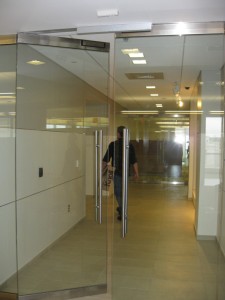 With so many locks available, it’s important to do a little research when it comes to choosing the types of locks you want in your facility. All locks, while having the same purpose of locking a door or a safe, are suited for a particular type of facility. This post discusses the ins and outs of electromagnetic locks, or mag locks as they’re known by the cool kids.
With so many locks available, it’s important to do a little research when it comes to choosing the types of locks you want in your facility. All locks, while having the same purpose of locking a door or a safe, are suited for a particular type of facility. This post discusses the ins and outs of electromagnetic locks, or mag locks as they’re known by the cool kids.
What is a mag lock?
This might seem pretty self-explanatory to the average reader. “Duh. It’s a magnetic lock, Whitney.” Ok, you’re right, but did you know that mag locks consist of an electromagnetic lock that is only operational with power applied? It’s true. When it comes to mag locks, battery backups are very necessary, especially if it’s the only way to secure the door.
Most places where mag locks are installed will require some sort of redundancy in the operation of the lock. This just means you will need two ways to trigger the lock. This can be done several ways; for example, by using a touch sense bar and a motion/IR sensor to trigger the lock to open or a key switch, etc..
Mag locks can be a little more difficult when it comes to complying with code. Many AHJs (Authority Having Jurisdiction) require electrical plans and permits to be able to install these if they allow them to be installed at all.
Where They’ll Work:
With so many codes to comply with, finding a mag lock’s perfect fit can be a little tricky. They work really well when it comes to integration into access control systems. If you’re also in a facility that doesn’t handle a lot of free egress, such as detention centers and correctional facilities, a mag lock would work well.
Where They Won’t Work:
First, it’s important to note that no matter what, the AHJ has the final say on whether or not your facility is allowed to install mag locks. If they say no, then sorry, you’re out of luck. Mag locks are a little tricky to use in buildings that process a lot of heavy traffic. To gain access, you typically need either a keypad or card swipe and that wouldn’t be feasible for a large amount of traffic. The bottom line is that mag locks can be a little restrictive and are often omitted from plans because of the headaches they cause.
The Final Word:
At the end of the day, aside from your AHJ’s ruling, the use of mag locks is going to be something you have to decide on whether or not they will be productive for your facility. If this is something you feel will work for your facility, they’re a great product. Otherwise, it might be a better idea to stick to a different type of locking system.
